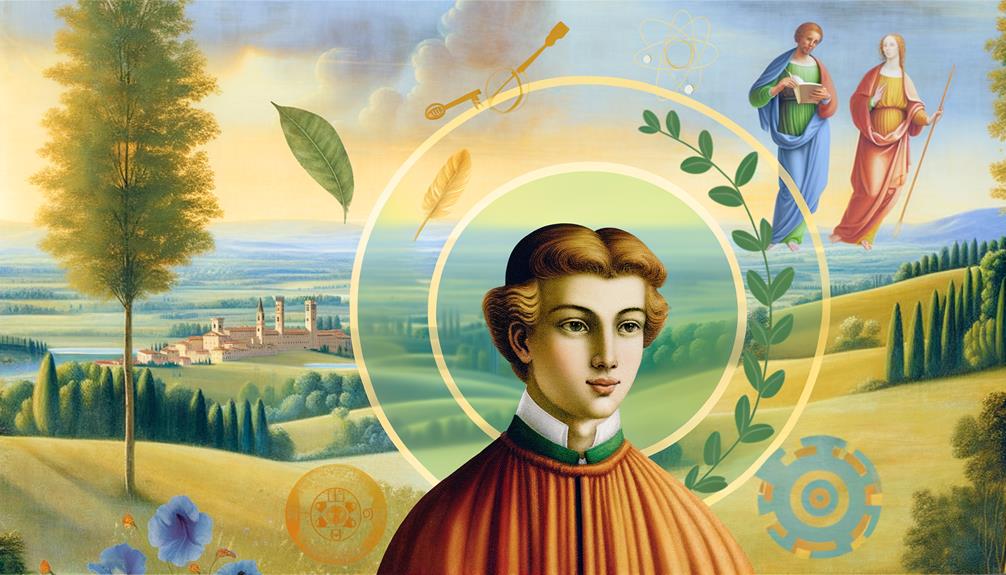Meaning of the Name Leonardo
The name Leonardo is derived from the Old High German words 'leon' (lion) and 'hard' (brave or hardy). It signifies strength, courage, and noble bravery.
Historically, it is associated with influential figures like Renaissance polymath Leonardo da Vinci and contemporary actor Leonardo DiCaprio, connoting excellence and multifaceted talent. The name enjoys global cultural resonance and enduring popularity, particularly in Italy, Spain, and the United States.
Its rich symbolism, combining intellectual prowess with a courageous spirit, reflects a timeless appeal. To uncover more about its significant legacy and cultural impact, there is much to explore.

Key Takeaways
- The name Leonardo derives from Old High German elements meaning 'lion' and 'brave.'
- It symbolizes strength, courage, and noble bravery across various cultures.
- Historically, it is linked to influential figures like Leonardo da Vinci.
- The name reflects artistic brilliance, innovation, and intellectual prowess.
- Leonardo remains popular globally, influenced by its rich historical and cultural significance.
Origins and Etymology
Rooted in the Germanic languages, the name Leonardo derives from the Old High German elements 'leon' meaning lion and 'hard' meaning brave or hardy. This etymology underscores a symbolic association with strength and courage, characteristics historically revered in many cultures.
The amalgamation of 'leon' and 'hard' produces a name that conveys a sense of noble bravery, a quality often attributed to lions as regal animals. Over time, this name found its way into various languages and cultures, adapting phonetically and orthographically to fit local linguistic norms. However, the core meaning has remained remarkably consistent.
This consistency has contributed to the enduring popularity of the name Leonardo across different eras and regions, reflecting its deep-rooted etymological significance.
Historical Significance
The historical significance of the name Leonardo is underscored by its association with several prominent figures who have shaped various fields such as art, science, and exploration.
The name conjures an image of innovation and intellectual prowess, reflecting its bearers' substantial contributions to human progress. In the Renaissance period, the name gained prominence, symbolizing a blend of creativity and scientific inquiry.
This era's emphasis on rediscovery and human potential is mirrored in the individuals who bore the name, making it synonymous with excellence and ingenuity. Over centuries, the legacy of the name Leonardo has been ingrained in the cultural and intellectual fabric of society, highlighting its enduring influence across multiple domains of human endeavor.
Famous Leonardos
Renowned individuals named Leonardo have made significant impacts in diverse fields, ranging from art and science to sports and entertainment. Leonardo da Vinci, a polymath of the Renaissance era, excelled in painting, anatomy, engineering, and more, leaving an indelible mark on human history.
In contemporary times, Leonardo DiCaprio has achieved critical acclaim in film, earning accolades for his acting prowess and environmental activism.
Leonardo Bonucci stands out in sports, particularly in football, where his defensive skills have been essential for both club and country.
Each of these figures, through their exceptional contributions and dedication, has elevated the name Leonardo to a symbol of excellence and multifaceted talent, underscoring the diverse potential encapsulated within this historic name.
Cultural Impact
The name Leonardo carries significant cultural weight, especially through the enduring legacy of Leonardo da Vinci, whose contributions to art and science during the Renaissance remain unparalleled. Cinematic and literary portrayals of individuals named Leonardo further enhance the name's cultural resonance, often symbolizing genius and creativity.
In contemporary society, the name continues to be influential, appearing frequently in various forms of modern media and popular culture, thereby solidifying its timeless relevance.
Artistic Renaissance Legacy
Leonardo da Vinci's multifaceted contributions to art during the Renaissance period have left an indelible mark on cultural history, illustrating the profound synergy between artistic innovation and scientific inquiry. His work epitomizes the Renaissance ideal of a polymath, seamlessly blending anatomy, geometry, and perspective into masterpieces that continue to captivate.
- The Last Supper: This mural demonstrates his mastery of composition and emotional expression, revolutionizing religious art.
- Mona Lisa: Renowned for its enigmatic smile, it showcases Leonardo's pioneering use of sfumato and psychological depth.
- Vitruvian Man: A study of human proportions, it fuses art with anatomical precision, reflecting his scientific curiosity.
- Codices: His detailed notebooks reveal innovative techniques and ideas that influenced future generations of artists and engineers.
Leonardo's legacy endures, bridging the domains of art and science.
Cinematic and Literary Portrayals
Exploring Leonardo da Vinci's profound influence, cinematic and literary portrayals have meticulously depicted his genius, capturing the essence of his contributions to both art and science. From Walter Isaacson's in-depth biography to the dramatized series 'Da Vinci's Demons,' these works delve into Leonardo's multifaceted intellect.
Films like 'The Da Vinci Code' leverage his enigmatic persona, while historical novels explore his innovative techniques and inventions. These portrayals emphasize Leonardo's polymathic nature, illustrating his ability to transcend mere artistic creation to encompass scientific inquiry and technological foresight.
Each narrative, whether visual or textual, seeks to unravel the mystique surrounding da Vinci, solidifying his position as a timeless figure of unparalleled intellectual prowess.
Modern Cultural References
In contemporary culture, Leonardo da Vinci's legacy manifests through various mediums, profoundly shaping modern art, science, and technology discourse. His influence resonates in numerous fields, underscoring his timeless relevance.
Art: Modern artists draw inspiration from da Vinci's meticulous techniques and innovative compositions, often referencing his masterpieces.
Science: His scientific notebooks continue to inspire researchers with their groundbreaking ideas in anatomy, physics, and engineering.
Technology: Da Vinci's conceptual inventions, such as flying machines, inform contemporary technological advancements and innovative design practices.
Education: Institutions globally incorporate his interdisciplinary approach, promoting a curriculum that bridges art and science.
This multifaceted impact underscores Leonardo's enduring significance, fostering a rich dialogue between historical genius and present-day innovation.
Popularity Over Time
Over the decades, the name Leonardo has experienced fluctuating levels of popularity, influenced by various cultural, historical, and social factors. Historically, the name surged in prominence during the Renaissance due to Leonardo da Vinci's enduring legacy.
In the late 20th and early 21st centuries, the name saw renewed interest, partly spurred by the celebrity status of actor Leonardo DiCaprio. Statistical data reveal that its popularity has been particularly robust in countries like Italy, Spain, and the United States.
Social trends, such as the increasing appreciation for classic, timeless names, have also contributed to its sustained usage. Therefore, the name Leonardo illustrates how historical figures and contemporary cultural icons can impact naming trends across different eras.
Variations in Different Languages
The global appeal of the name Leonardo is further evidenced by its various adaptations in different languages, reflecting both cultural nuances and phonetic preferences.
These variations provide insight into how different cultures embrace and modify the name to fit their linguistic frameworks:
- Leonard – Common in English-speaking countries, it simplifies the name while retaining its core essence.
- Léonard – The French version, which adds an accent to suit French pronunciation and orthographic traditions.
- Leonhard – A German adaptation that emphasizes the strong consonantal sounds typical in Germanic languages.
- Leopold – Though slightly different, this variant is popular in Central Europe and shares a similar etymological root.
These variations highlight the name's versatility and its ability to traverse cultural boundaries while maintaining its intrinsic identity.
Symbolism and Meaning
The name Leonardo carries deep historical roots, originating from the Old Germanic elements 'leon' meaning lion and 'hard' meaning brave or hardy.
Its artistic and cultural significance is further elevated by figures such as Leonardo da Vinci, whose contributions to art, science, and invention have left an indelible mark on history.
This dual heritage imbues the name with connotations of strength, creativity, and intellectual prowess.
Historical Name Origins
Tracing its roots back to the Germanic languages, the name Leonardo derives from the elements 'leon,' meaning lion, and 'hard,' meaning brave or hardy, symbolizing a courageous and strong individual. This etymology reflects the qualities historically attributed to those bearing the name, projecting an image of leadership and resilience.
The name's evolution can be traced through several key points:
- Germanic Origins: The earliest forms of the name can be found in Old High German and Old English.
- Medieval Usage: Gained prominence across Europe during the Middle Ages.
- Italian Renaissance: Became widely recognized due to notable figures, reinforcing its cultural resonance.
- Modern Adaptations: Continues to be a popular name globally, retaining its original symbolic meaning.
This historical lineage underscores the enduring appeal of the name Leonardo.
Artistic and Cultural Significance
Reflecting on its rich historical origins, the name Leonardo has also garnered significant artistic and cultural symbolism, emblematic of creativity, intellectual prowess, and timeless influence. Leonardo da Vinci epitomizes this connotation, his genius spanning art, science, and engineering, symbolizing the Renaissance ideal of a polymath. His masterpieces, such as the *Mona Lisa* and *The Last Supper*, have cemented the name Leonardo as synonymous with artistic brilliance and innovation.
The name conveys a sense of enduring legacy, as seen in modern cultural references from Leonardo DiCaprio's cinematic impact to Leonardo Fibonacci's mathematical contributions. Thus, the name Leonardo transcends mere nomenclature, embodying a profound intersection of creativity and intellectual achievement across centuries.
Modern Usage
Frequently observed in contemporary society, the name Leonardo retains significant popularity and cultural relevance across various regions and demographics. This enduring appeal can be attributed to several key factors:
- Celebrity Influence: High-profile individuals like actor Leonardo DiCaprio have contributed to the name's modern allure.
- Cultural Resonance: The name's historical and artistic associations continue to evoke a sense of sophistication and creativity.
- Global Usage: Leonardo is embraced globally, with a notable presence in countries such as Italy, Brazil, and the United States.
- Versatility: The name's adaptability across different languages and cultures enhances its widespread acceptance.
These elements collectively underscore Leonardo's enduring relevance in contemporary naming practices, transcending mere tradition to embody a versatile, modern identity.
Choosing the Name
Given its enduring popularity and cultural resonance, choosing the name Leonardo involves considering a blend of historical significance, modern appeal, and personal relevance.
Historically, Leonardo has been associated with figures such as Leonardo da Vinci, symbolizing creativity and intellect. This historical weight can impart a sense of legacy and distinction to the name.
In contemporary settings, Leonardo remains versatile, often perceived as sophisticated yet approachable, making it suitable for various cultures and demographics.
Personal relevance is also paramount; parents may choose Leonardo to honor family heritage or embody attributes they wish for their child.
Conclusion
In summation, the name Leonardo, much like a timeless piece of art, embodies a rich tapestry of historical significance, cultural impact, and linguistic variations. Its origins trace back to ancient roots, while its enduring popularity and symbolic meanings continue to resonate across generations.
The name's prevalence among notable figures further cements its stature. When choosing a name, Leonardo offers a profound legacy and a multifaceted identity, making it a compelling choice for contemporary use.






